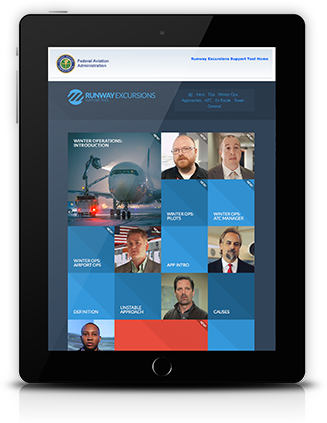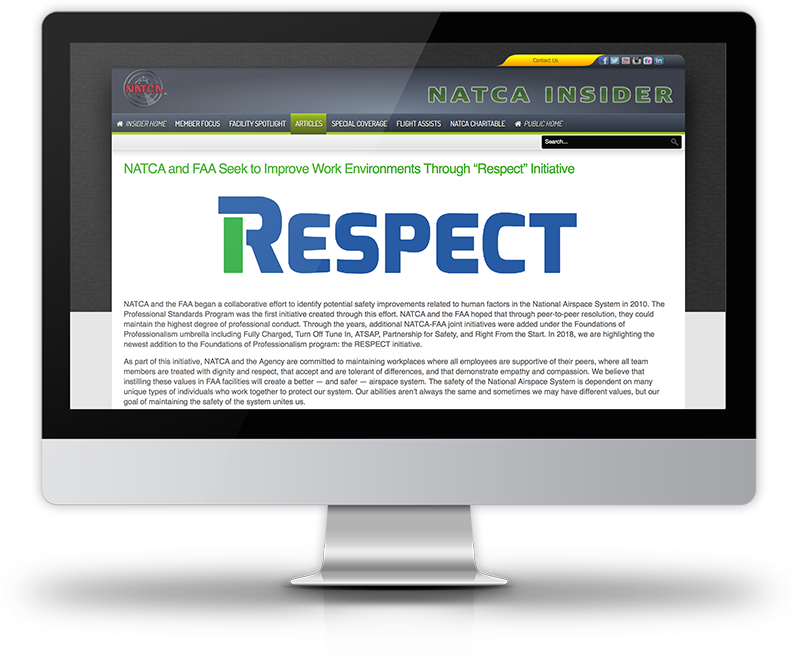About Partnership for Safety
Our Mission
The mission of the Partnership for Safety program is to facilitate the identification and mitigation of hazards at the local level through the use of collaborative Local Safety Councils comprised of local bargaining unit representatives and management at facilities in the National Airspace System (NAS).
![]()
Local Safety
Council
A collaborative team that encourages employees to proactively engage in identifying and mitigating local safety concerns.
![]()
This level of analytic capability,
backed by facility benchmarks, has never before been in the hands of the frontline employees.
![]()
The PFS Tools
allow local safety councils to quickly identify, share, and solve issues that may not have come to light until a more serious incident occurred.
![]()
We are a bridge
between the front line employees, safety-critical data, and analytic capabilities.

About the National Air Traffic Controllers Association (NATCA)
NATCA represents a variety of bargaining units, from Air Traffic Control to Engineers and Architects. These bargaining units consist of members split up over 10 different regions, nine of which correspond to the geographic boundaries set by the FAA and deal primarily with air traffic related personnel.
The regions are broken up as such: Alaska, Central, Eastern, Great Lakes, New England, Northwest Mountain, Southern, Southwest, Western Pacific, and Region X. Region X, unlike the others, is nationwide in scope and encompasses the union's other represented bargaining units such as Engineers and Architects, Aerospace Medicine and more.

About the Federal Aviation Administration (FAA)
The Federal Aviation Administration (FAA) is the national aviation authority of the United States. An agency of the United States Department of Transportation, it has authority to regulate and oversee all aspects of civil aviation in the U.S. The Federal Aviation Act of 1958 created the organization under the name "Federal Aviation Agency", and adopted its current name in 1966 when it became a part of the United States Department of Transportation.

About the National Airspace System (NAS)
The National Airspace System (NAS) of the United State has become one of the most complex aviation systems in the world, averaging about 50,000 flights each day.
The NAS is comprised of airspace; airports; aircraft; pilots; air navigation facilities; air traffic control (ATC) facilities; communication, surveillance, navigation, and supporting technologies and systems; operating rules, regulations, policies, and procedures; and the people who implement, sustain, or operate the system components. Together, these teams, technologies, and procedures work to provide safe and expeditious flight travel.
Play Your Part
Interested In Becoming a Member of Your Local Safety Council?
- Have discussion with facility leadership
- Sign up for training via the change request form
What's Next
Monthly Webinars
Tuesday, July 15th, 2025 1300 ET
Register For Tuesday
Thursday, July 17th, 2025 1300 ET
Register For Thursday
These webinars occur every third Tuesday and Thursday of every month.
Have a suggestion? If you have an idea for future webinars, please contact us at pfs@natca.net.
Things You Need to Know
We are looking for LSC’s to shine in our LSC Spotlight.Please contact us at pfs@natca.net to share your LSC story.
Remember: Monthly SAFE Discussions are mandatory.
Upcoming Training
July
Thursday, July 3rd 1300 ET
Register For Training
Monday, July 28th 1300 ET
Register For Training
August
Thursday, August 7th 1300 ET
Register For Training
Tuesday, August 12th 1300 ET
Register For Training
Your PFS Tools
Making safety data available to frontline personnel.
Your PFS tools are specifically designed for safety professionals, such as yourselves. They make information easier to access and more facility-specific.

Programs









Air Traffic Safety Action Program (ATSAP)
As part of our overall safety goals, ATSAP has established a system for our Controllers and Other Employees to voluntarily identify and report safety and operational concerns.
Fully Charged - Fatigue Education Awareness
Fully Charged is a joint campaign sponsored by the FAA, NATCA, and PASS to promote fatigue education awareness by providing the workforce with tools to self-educate and mitigate fatigue hazards.
Turn Off, Tune In - Managing Distractions in the NAS
With all of the information we see every day, it’s easy to get distracted. No text message, email, website, or digital diversion is worth the risk of endangering the flying public or compromising the safety of the NAS.
What’s On Your Runway - Reducing Runway Excursions
FAA and our industry partners are working hard to reduce the risk of runway excursions.
Respect Campaign - Respect—It’s Your Choice
Committed to maintaining workplaces where all employees are supportive of their peers, where all team members are treated with dignity and respect, that accept and are tolerant of differences, and that demonstrate empathy and compassion.
FAQs
What is Partnership for Safety?
The mission is to facilitate the identification and mitigation of hazards at the local level through the use of collaborative Local Safety Councils. Partnership for Safety supports local collaborative efforts between FAA Management and NATCA to develop solutions to identified safety issues. The Local Safety Council's composition and processes are determined locally by the Air Traffic Manager and NATCA Facility Representative.
What does a Local Safety Council do?
Local Safety Councils collaboratively identify and mitigate local safety hazards. They will review safety issues and perform post occurrence analysis at the direction of the Air Traffic Manager and NATCA Facility Representative, to determine systemic causal factors and risk.
Who comprises the Local Safety Council?
A Local Safety Council is comprised of, as a minimum:
- one management representative and one union representative
as designated by the NATCA Facility Representative and the Air Traffic Manager.
How many people can there be on an LSC?
A minimum of one management representative and one union representative will make up the LSC with additional representatives being designated by the parties at the local level, through mutual agreement.
LSCs should meet once per month or as mutually determined by the parties at the local level.
What kinds of issues does a Local Safety Council handle?
Local Safety Councils convene to explore and develop mitigations/propose solutions to locally identified operational safety concerns.
What happens when an LSC recommends a change?
Local Safety Council activity depends upon the scope of the change. Potentially an LSC could recommend changes in the Standard Operating Procedures (SOPs), Letters of Agreement (LOAs), or other operation procedures. The LSC may also recommend and sponsor a Safety Risk Management Panel (SRMP) in order to perform a formalized safety analysis of identified hazard(s).
What tools are available to LSCs through the PFS website?
The PFS Website is designed as an all in one destination for accessing and sharing information. The goal is to create a resource that supports the development and functionality of Local Safety Councils. The PFS tools that can be accessed through the website are the Safety Data Portal and the ATC infoHUB.
Who is allowed access to the PFS tools?
The Safety Data Portal and the ATC infoHUB are restricted sites that can only be accessed by active members of the LSC.
My Local Safety Council has already been established, why do I need to complete another form?
Each new LSC member does go through the same coordination process. We utilize the information from the website, LSC Changes, to solicit concurrence from both the Air Traffic Manager and NATCA Facility Representative for each new member.
The website serves as our method of tracking, and using them is the most expedient way of adding new members. This automation also ensures that each of us, whom are jointly responsible for coordinating training logistics, receives and is working with, the same information.
As personnel fluctuate, identifying the current Air Traffic Manager/NATCA Facility Representative ensures that we are soliciting concurrence from the correct individuals.
The PFS Team is working to complete the validation process and establish your user accounts. A confirmation request has been sent to both the ATM and FACREP. Once they reply with their concurrence, we create account credentials for each active member within a few business days and update our records accordingly.
We recommend using the Google Chrome browser for this site. Many of the dashboard features are not compatible with Internet Explorer.
Questions? Suggestions?
Please email us at:
pfs@natca.net